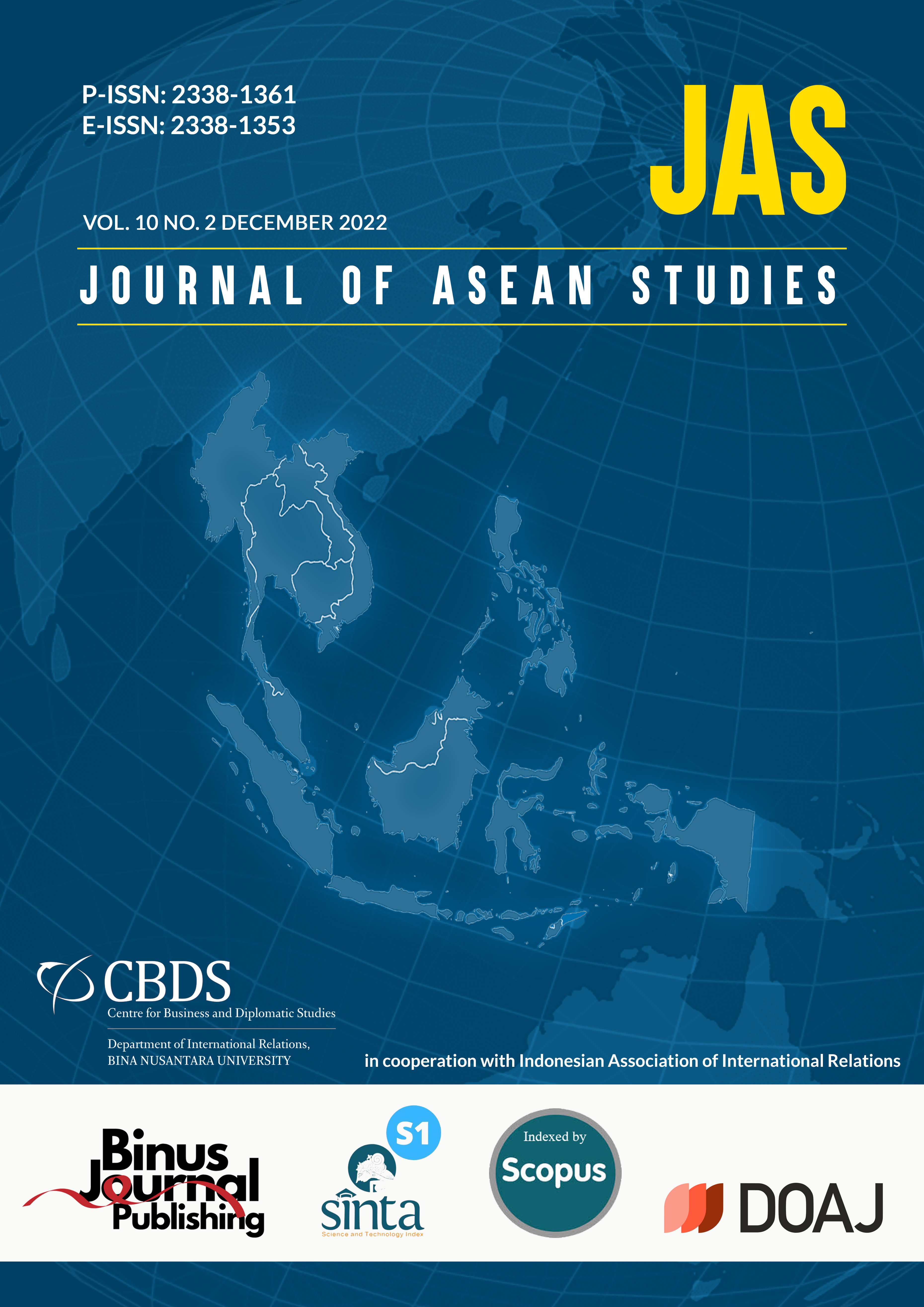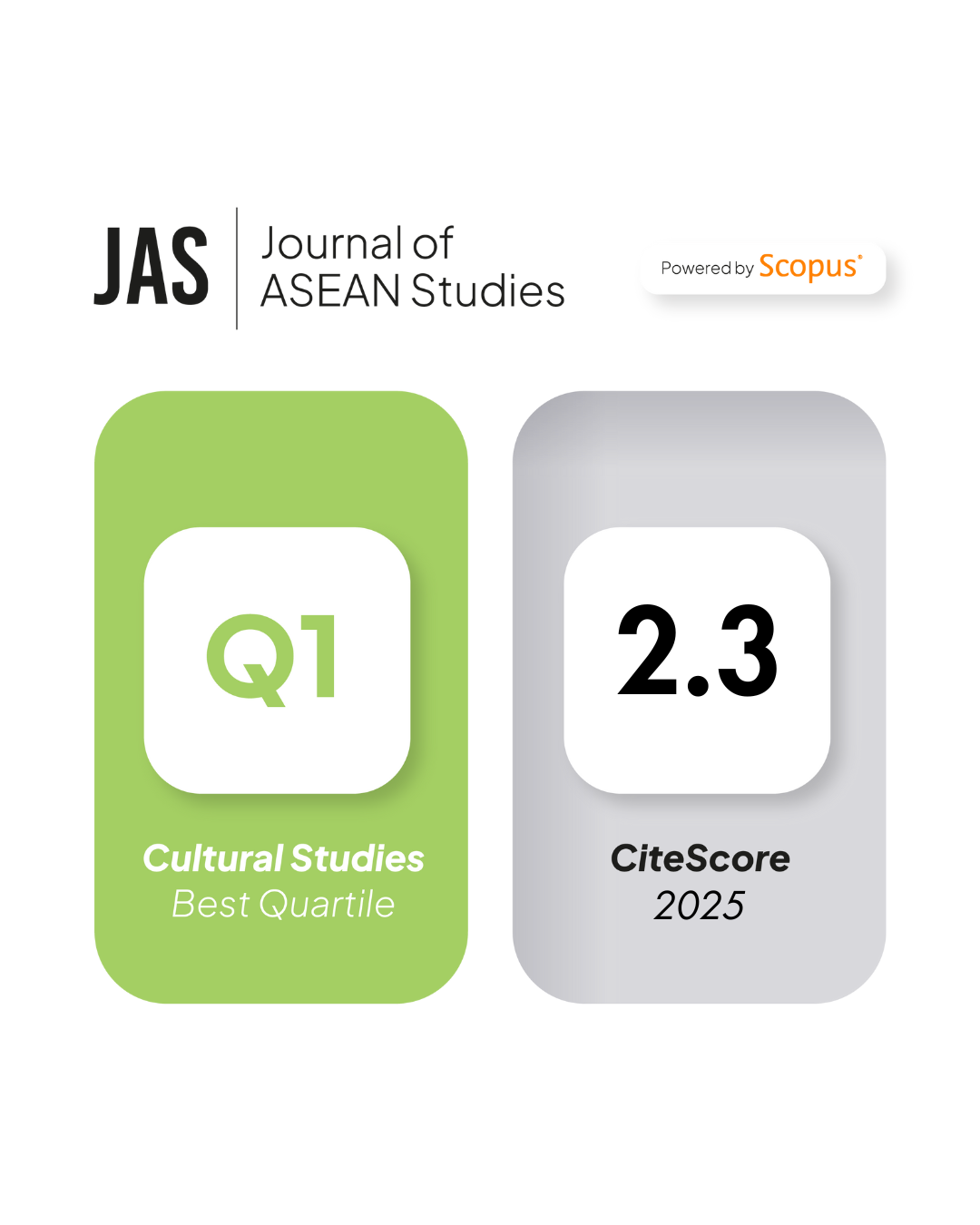Democratization in the Digital Era: Experience from Southeast Asia
DOI:
https://doi.org/10.21512/jas.v10i2.9361Keywords:
democratization, digital era, cyberspace, Southeast AsiaAbstract
Southeast Asia is home to about 8.5% of the world’s total population and 10% of its internet users, yet it is also home to 12.7% of the world’s social media users. The exponential growth in internet and social media utilization poses both opportunities and challenges towards democratization. The research aims to examine how the digital sphere may or may not support inclusive and deliberative democracy in the region. Using elaboration on case studies from Indonesia, Malaysia, the Philippines, and Vietnam, the current study is reflecting on shared challenges and opportunities in preserving democracy amidst the rapid development of cyberspace as a mode of political communication. The findings suggest that digital space has been instrumental in harassing dissent or jailing opposition members in countries like the Philippines and Vietnam. On the other hand, the use of technology provides an opportunity to foster a more deliberative and inclusive democracy in Indonesia and Malaysia. The article contributes to the wider conversation on democracy and the digital sphere in Association of Southeast Asian Nations (ASEAN) member countries.
References
Abbott, J. (2015). Hype or hubris? The political impact of the Internet and social networking in Southeast Asia. In W. Case (Eds.), Routledge Handbook of Southeast Asian Democratization (1st Ed., pp. 213–234). Routledge. https://doi.org/10.4324/9781315674735-20
Azhar, K. (2022, October 25). Special Report - GE15: Automatic registration of voters — not the youth — is the wild card. The Edge Markets. https://www.theedgemarkets.com/article/special-report-ge15-automatic-registration-voters-%E2%80%94-not-youth-%E2%80%94-wild-card
Berghel, H. (2013). Through the PRISM Darkly. Computer, 46(7), 86–90. https://doi.org/10.1109/MC.2013.253
Bernal, P. (2016). Data gathering, surveillance and human rights: recasting the debate. Journal of Cyber Policy, 1(2), 243–264. https://doi.org/10.1080/23738871.2016.1228990
Bigo, D. (2017). Digital Surveillance and Everyday Democracy. In L. Weber, E. Fishwick, & M. Marmo (Eds.), The Routledge International Handbook of Criminology and Human Rights (pp. 125–135). Routledge.
Biro Dasar Muda. (2022, October 22). Kertas Hitam MUDA. Parti MUDA. https://muda.my/pru15/kertashitam/
Blanchard, B. (2009, July 6). China tightens Web screws after Xinjiang riot. Reuters. https://www.reuters.com/article/us-china-xinjiang-internet-idUSTRE5651K420090706
Canella, G. (2018). Racialized surveillance: Activist media and the policing of Black bodies. Communication Culture & Critique, 11(3), 378–398. https://doi.org/10.1093/ccc/tcy013
Clark, H. (2013, August 21). Vietnam’s dysfunctional relationship with the web. Index on Censorship. https://www.indexoncensorship.org/2013/08/vietnams-dysfunctional-relationship-with-the-web/
Cloud, D. S., & Bengali, S. (2020, October 22). How Facebook censorship helps suppress dissent in Vietnam. Los Angeles Times. https://www.latimes.com/world-nation/story/2020-10-22/facebook-censorship-suppress-dissent-vietnam
Cong an Nhan dan. (2020, October 8). Facebook sẽ chặn quảng cáo chÃnh trị từ các tà i khoản phản Ä‘á»™ng [Facebook will block political ads from subversive accounts]. Cong an Nhan dan. https://congan.com.vn/tin-chinh/facebook-se-chan-quang-cao-chinh-tritu-cac-tai-khoan-phan-dong_100905.html
Curtis, H., Hogeveen, B., Kang, J., Le Thu, H., Rajagopalan, R. P., & T., R. (2022). Digital Southeast Asia. Opportunities for Australia-India cooperation to support the region in the post Covid-19 context (No. 57). Australian Strategic Policy Institute. https://www.orfonline.org/wp-content/uploads/2022/02/Digital-Southeast-Asia.pdf
Deans, J. (2005, June 7). China cracks down on bloggers. The Guardian. https://www.theguardian.com/media/2005/jun/07/chinathemedia.digitalmedia1
Dencik, L., Hintz, A., & Carey, Z. (2018). Prediction, pre-emption and limits to dissent: Social media and big data uses for policing protests in the United Kingdom. New Media & Society, 20(4), 1433–1450. https://doi.org/10.1177/1461444817697722
Duc, H. (2012). Ben Thang Cuoc (II Quyen Binh). OsinBook.
Dwoskin, E., Newmyer, T., & Mahtani, S. (2021, October 25). The Case Against Mark Zuckerberg: Insiders Say Facebook’s CEO Chose Growth over Safety. Washington Post. https://www.washingtonpost.com/technology/2021/10/25/mark-zuckerberg-facebook-whistleblower/
Election Commission of Malaysia. (2022). Portal Rasmi Suruhanjaya Pilihan Raya Malaysia (SPR). Election Commission of Malaysia. https://www.spr.gov.my/
Freedom House. (2021). Freedom on The Net 2021: The Global Drive to Control Big Tech. https://freedomhouse.org/sites/default/files/2021-09/FOTN_2021_Complete_Booklet_09162021_FINAL_UPDATED.pdf
Gnaneswaran, D. (2020, July 17). The world’s first-ever youth-led digital “parliament†goes live with Microsoft Teams. Microsoft Malaysia News Center. https://news.microsoft.com/en-my/2020/07/17/worlds-first-ever-youth-led-digital-parliament-goes-remote-with-microsoft-teams/
Goold, B. J. (2010). How much surveillance is too much? Some thoughts on surveillance, democracy, and the political value of privacy. In D. W. Schartum (Ed.), Overvåkning i en rettsstat – Surveillance in a Constitutional Government (pp. 38–48). Fagbokforlaget.
Hiep, L. H. (2019). The political economy of social media in Vietnam. ISEAS Perspective, 2019(77), 1–7. https://www.iseas.edu.sg/images/pdf/ISEAS_Perspective_2019_77.pdf
Hoang, D., An, C., & Nam, D. (2017, November 22). Connected for 20 years: How the internet has changed life in Vietnam. VnExpress International. https://e.vnexpress.net/news/travel-life/connected-for-20-years-how-the-internet-has-changed-life-in-vietnam-3674013.html
Kemp, S. (2021, November 29). A Decade in Digital. DataReportal – Global Digital Insights. https://datareportal.com/reports/a-decade-in-digital?utm_source=Global_Digital_Reports&utm_medium=Partner_Article&utm_campaign=Digital_2022
Lakhdhir, L. (2021, May 21). Indonesia: Suspend, Revise New Internet Regulation. Human Rights Watch. https://www.hrw.org/news/2021/05/21/indonesia-suspend-revise-new-internet-regulation
Luong, D. (2017a, February 2). In Facebook, young Vietnamese see an ally. VnExpress. https://e.vnexpress.net/news/news/in-facebook-young-vietnamese-see-an-ally-3535044.html
Luong, D. (2017b, November 30). Vietnam Wants to Control Social Media? Too Late. The New York Times, https://www.nytimes.com/2017/11/30/opinion/vietnam – social – media – china.html.
Marder, B., Joinson, A., Shankar, A., & Houghton, D. (2016). The extended “chilling†effect of Facebook: The cold reality of ubiquitous social networking. Computers in Human Behavior, 60, 582–592. https://doi.org/10.1016/j.chb.2016.02.097
Masna, A. (2011). Indonesia is Just Getting Started on the Internet. DailySocial. https://dailysocial.id/post/indonesia-is-just-getting-started-on-the-internet
Merdeka Center. (2022, September 20). Highlights of Muslim Youth Survey. Merdeka Center. https://merdeka.org/v2/download/highlights-of-muslim-youth-survey/
NBC. (2006, June 30). China cracks down on blogs, search engines. NBC News. https://www.nbcnews.com/id/wbna13628295
O’Donnell, G. A. (1996). Illusions about consolidation. Journal of Democracy, 7(2), 34–51. https://doi.org/10.1353/jod.1996.0034
Oni, E. O. (2014). The challenges of democratic consolidation in Nigeria 1999-2007. International Journal of Politics and Good Governance in Nigeria, 5(5), 1–29. http://www.onlineresearchjournals.com/ijopagg/art/145.pdf
OpenNet Initiative. (2012). Information Controls in Vietnam. https://opennet.net/blog/2012/09/update-threats-freedom-expression-online-vietnam
Owen, S. (2017). Monitoring social media and protest movements: ensuring political order through surveillance and surveillance discourse. Social Identities, 23(6), 688–700. https://doi.org/10.1080/13504630.2017.1291092
Pearson, J. (2020, November 20). Exclusive: Vietnam threatens to shut down Facebook over censorship requests - source. Reuters. https://www.reuters.com/article/vietnam-facebook-shutdown-idUSKBN28007K
Peel, M. (2015, March 27). Hanoi residents mobilise to save city’s cherished trees. Financial Times. https://www.ft.com/content/54d07f2a-d462-11e4-8be8-00144feab7de
Penney, J. W. (2016). Chilling effects: Online surveillance and Wikipedia use. Berkeley Technology Law Journal, 31(1), 117–182. https://doi.org/10.15779/Z38SS1
Pham, M. & Nguyen, M. (2016, December 24). Vietnam says recovery from Formosa industrial disaster could take a decade. Reuters. https://www.reuters.com/article/us-vietnam-environment-formosa-plastics-idUSKBN14C1F5
Prihatini, E. (2020). Women and social media during legislative elections in Indonesia. Women’s Studies International Forum, 83, 1–9. https://doi.org/10.1016/j.wsif.2020.102417
Puskapol UI. (2019). Politik Identitas Dalam Kampanye Pemilu 2019 [Identity Politics in the 2019 Election Campaign]. Puskapol UI. https://www.puskapol.ui.ac.id/publikasi_puskapol/politik-identitas-dalam-kampanye-pemilu-2019-2.html
Rojszczak, M. (2021). Surveillance, legal restraints and dismantling democracy: Lessons from Poland. Democracy and Security, 17(1), 1–29. https://doi.org/10.1080/17419166.2020.1841367
SAFEnet. (2022, March 5). Digital Rights Situation Report Indonesia 2021: In Indonesia, Digital Repression Keep Continues. SAFEnet. https://safenet.or.id/2022/03/in-indonesia-digital-repression-is-keep-continues/
Sinpeng, A. (2020). Digital media, political authoritarianism, and Internet controls in Southeast Asia. Media Culture & Society, 42(1), 25–39. https://doi.org/10.1177/0163443719884052
Sinpeng, A. (2021). Opposing Democracy in the Digital Age. University of Michigan Press. https://www.press.umich.edu/11666233/opposing_democracy_in_the_digital_age
Sinpeng, A., & Koh, Y. (2022). Journalism in the Age of Digital Autocracy: A Comparative ASEAN Perspective. Journal of ASEAN Studies, 10(2). (in press) https://doi.org/10.21512/jas.v10i2.9162
Smith, R. B., Perry, M., & Smith, N. N. (2021). Fake News in ASEAN: Legislative Responses. Journal of ASEAN Studies, 9(2), 117–137. https://doi.org/10.21512/jas.v9i2.7506
Stocking, B. (2009, November 17). Vietnam Internet users fear Facebook blackout. The Sydney Morning Herald. https://www.smh.com.au/technology/vietnam-internet-users-fear-facebook-blackout-20091117-iki0.html
Stoycheff, E., Burgess, G. S., & Martucci, M. C. (2020). Online censorship and digital surveillance: the relationship between suppression technologies and democratization across countries. Information, Communication and Society, 23(4), 474–490. https://doi.org/10.1080/1369118X.2018.1518472
Stoycheff, E., Liu, J., Xu, K., & Wibowo, K. (2019). Privacy and the Panopticon: Online mass surveillance’s deterrence and chilling effects. New Media & Society, 21(3), 602–619. https://doi.org/10.1177/146144481880131
Tadem, T. S. E. & Tadem, E. C. (2016). Political dynasties in the Philippines: Persistent patterns, perennial problems. South East Asia Research, 24(3), 328–340. https://doi.org/10.1177/0967828X16659730
Talamayan, F. (2020). Policing Cyberspace: Understanding Online Repression in Thailand and the Philippines. Journal of ASEAN Studies, 8(2), 129–145. https://doi.org/10.21512/jas.v8i2.6769
Tyson, A., & Apresian, S. (2021). What’s Wrong With Us? An Analysis of Indonesian President Joko Widodo's Public Speeches from 2017 to 2018. Journal of ASEAN Studies, 9(2), 219–239. https://doi.org/10.21512/jas.v9i2.7318
Undi18 (Persatuan Pengundi Muda). (2022). Undi18. Youtube. https://www.youtube.com/channel/UCHm6jB9JkBBT9Fc6JThntWg
United Nations Human Rights Office of the High Commissioner. (1966). International Covenant on the Civil and Political Rights. https://www.ohchr.org/en/instruments-mechanisms/instruments/international-covenant-civil-and-political-rights
Valenzuela, J. (1992). Labour movements and political systems: Some variations. In M. Regini (Eds.), The Future of Labour Movements (pp. 53–101). Sage.
Watt, E. (2017). The right to privacy and the future of mass surveillance. The International Journal of Human Rights, 21(7), 773–799. https://doi.org/10.1080/13642987.2017.1298091
Zuboff, S. (2015). Big other: Surveillance capitalism and the prospects of an information civilization. Journal of Information Technology Impact, 30(1), 75–89. https://doi.org/10.1057/jit.2015.5
Downloads
Published
How to Cite
Issue
Section
License
Copyright (c) 2022 Athiqah Nur Alami, Dien Nguyen An Luong, Ella Prihatini, Eryan Ramadhani, Jan Robert R Go, Noorul Hafidzah, Ummu Atiyah

This work is licensed under a Creative Commons Attribution-NonCommercial 4.0 International License.






















